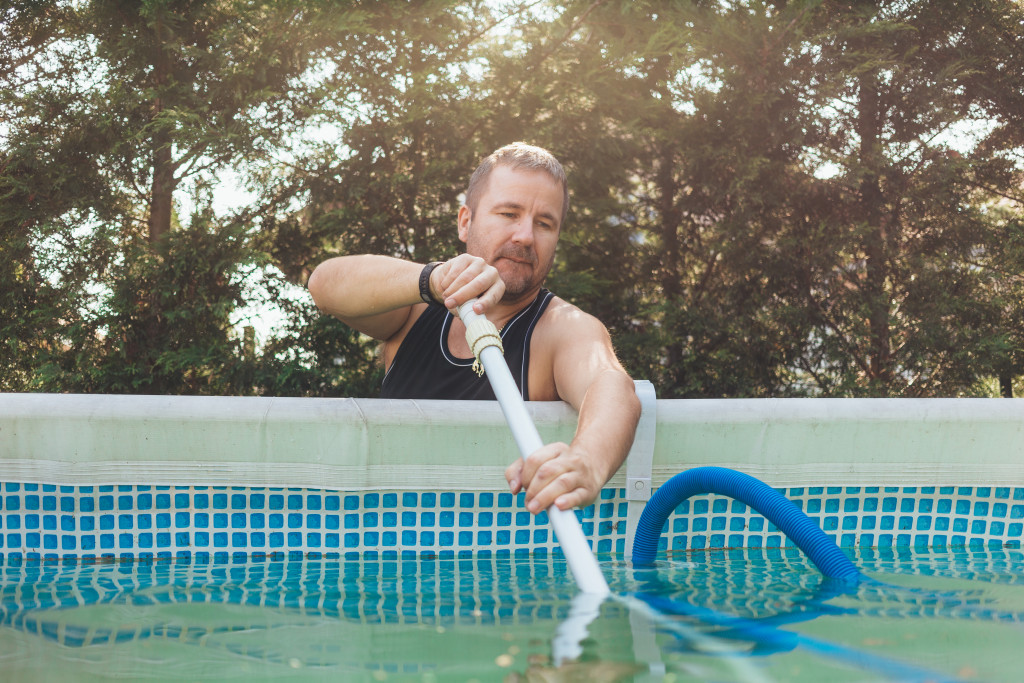One of the challenges of managing a residential pool is keeping the water clean and clear. There’s more to it than scooping leaves and twigs out of the water. Cleaning pool water and making it stay clean is more intricate than that.
There are external elements, bodily fluids, and other things that pool water can be introduced to. Needless to say, it’s the little particles, residues, and byproducts that are harder to spot and keep out of the water. Here are some basic yet effective ways to help keep your pool water clean from both visible and less visible debris and particles:
Remove Leaves and Other Organic Debris
A resident pool is more often place in the backyard where naturally there are plants and trees present. It’s inevitable for some dirt, twigs, or dead leaves to get in the pool. Although this is a cleaning problem that’s easily solved by removing debris with a pool rake, it should be done promptly before debris sinks into the pool. This will make it a little more difficult to retrieve later. In addition, it may even introduce bacteria to the water.
If there are any trees close to the pool, consider trimming the branches to prevent any leaves from falling into the water.
Get Rid of Sediments and Organic Buildup on Pool Walls
Different fine debris may be introduced to the pool water by the wind or swimmers’ bodies that can form sediments on pool walls and pool fixtures. This happens when some debris settles at the bottom of the pool. Although these settle to the bottom, some make it to the pool walls too. When the sediments make the water cloudy, that’s when you know that there’s too much sediment present.
During swimming seasons, be sure to brush pool walls weekly. Before doing so, be sure to switch off the pump. After brushing, the sediment is most likely going to join the others that have settled on the bottom of the pool. Use a vacuum to remove them effectively.

Clean Skimmers, Filter, and Pump Regularly
If a pool rake is for removing visible floating debris in the water, skimmers are for getting rid of the less visible ones. Contaminants such as oils, sweat, and more are mostly found on the surface of the water too. Skimmers, with their unnoticeable suction power, draw in these contaminants to help keep the water clean. Without them, it leaves a pool pump overworked and reduces its lifespan.
The filter and pump work hand in hand to get rid of both the suspended and floating particles in the water. The filter separates the sand, dirt, and other fine particles from the water while the pump ensures that the water circulated gets through the filter to remove said particles. For better performance, clean the skimmers, filter, and pump regularly. Remove and empty out the filter from debris and proceed to backwash to flush out contaminants from the filter.
Inspect Chemical Levels at Least Twice a Day
When it comes to inspecting pool water, pH and chlorine are the ones to keep your eye on.
There are two extremes on the pH scale: alkalinity and acidity. Maximum acidity is zero, while maximum alkalinity is fourteen. The pH level in pool water should be between 7.2 and 7.8, which is the safe middle ground. The pH level should fall in this range to prevent skin and eye irritation, and keep chlorine effective. If the pH levels test higher than 7.8, add an acid to lower the pH level in the pool.
Chlorine, on the other hand, is used to clean swimming pools. It prevents the formation of algae and bacteria in pools, as well as destroying any other impurities in the water. The pool water will be safe for everyone if both of them work together.
Monitoring chemical levels are crucial in keeping pool water clean and safe for swimmers. There is a wide range of tools and kits available in the market for this sole purpose. The two most common ways of testing chemical levels in a pool are pool testing kits test strips. Either way, these should be able to measures both pH and chlorine levels.
Nobody ever said that managing a pool is easy, or that having one in your backyard means you turning into a part-time chemist. It might take a while to get used to, especially with treating the pool water with the right levels of chlorine and pH. These are simply the basic yet essential parts of owning a pool. Having a pool in your backyard is a great way to have fun at home but to make it a truly enjoyable experience, it should be safe too.

